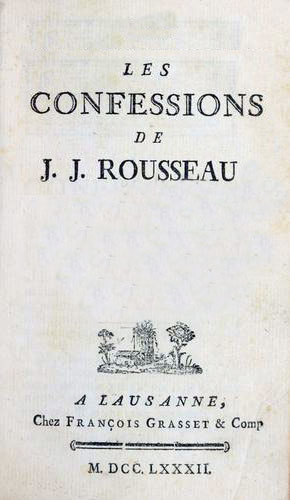Recommended translation: Rousseau, Jean-Jacques. Confessions. In The Confessions and Correspondence, Including the Letters to Malesherbes. Vol. 5 of The Collected Writings of Rousseau, edited by Christopher Kelly, Roger D. Masters, and Peter Stillman, translated by Christopher Kelly, 1–550. Hanover, NH: University Press of New England, 1995.
Published four years after Rousseau’s death in 1789, the Confessions was an autobiographical account of the first fifty-three years of the philosopher’s life. Rousseau declared that the work was groundbreaking with its opening line, “I have resolved on an enterprise which has no precedent and which, once complete, will have no imitator. My purpose is to display to my kind a portrait in every way true to nature, and the man I shall portray will be myself.” As Rousseau’s suggests, the work was unique not only because it told the story of a unique life, but because the literary form was unprecedented. Though several autobiographies like St. Augustine’s Confessions or St. Teresa’s Life of Herself were widely read, these works focused on the religious lives of their subjects and sought to inspire believers with carefully constructed religious narratives. Rousseau’s work was noteworthy because it discussed all aspects of his personal life and sought to expose his flaws and failures to give readers an accurate portrait of its author.
Online:
Amazon (Recommended translation)
Project Gutenberg (Read Free Online)
Internet Archive (Read Free Online)
